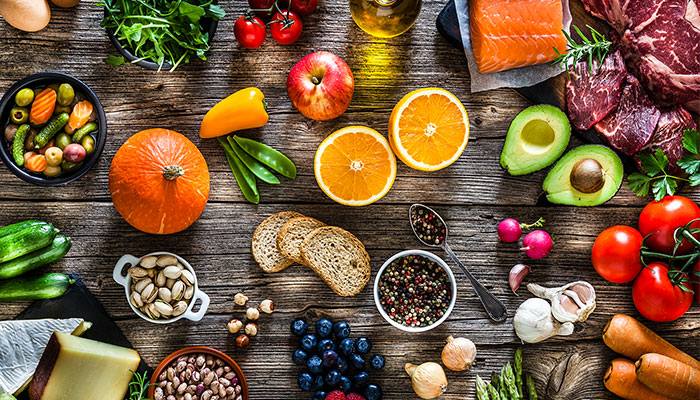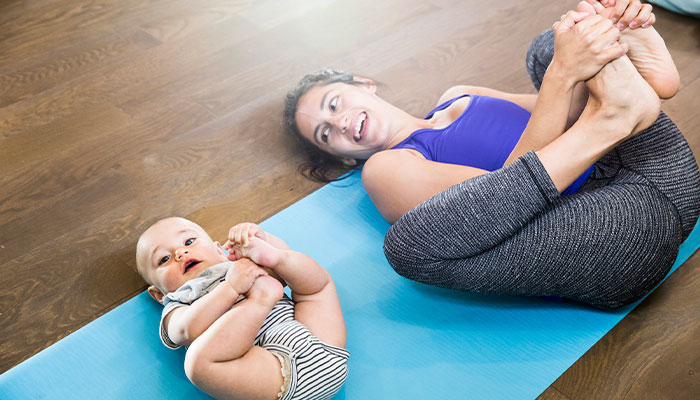Many of us struggle with our weight, and lockdowns during the COVID-19 pandemic added an extra layer of difficulty by keeping us at home and reducing opportunities for exercise.

Up and at 'em: It's time to put our COVID couch potato days behind us.
On average, Australian adults report having gained three to five kilograms during the first lockdown, with information still being collected on subsequent waves of the virus. According to Royal Australian College of General Practitioner data, one in three of us have reported gaining weight since COVID-19's arrival.
The effects of the pandemic are far from over, leaving us with a new normal of more time at home, but minus the lockdown habit of a daily walk to see something other than the same four walls.
To make matters worse, there is a clear link between being overweight or obese and how ill people become if they contract COVID.
Healthy weight varies from person to person and depends on factors such as gender, age and ethnicity, but the contributors are the same: a healthy diet, regular exercise, and good metabolic health, which takes in a range of measurements from waist circumference to blood sugar.
Healthy diet
Accredited dietitian Valentina Duong says unfortunately, there are no quick fixes when it comes to lasting weight loss.

Eat right: A Mediterranean diet rich in fruit, vegetables, nuts and fish is the way to go, with red meat and dairy kept to a minimum.
"It takes time for us to gain those extra kilos, and it also takes time to lose them," Duong says.
"About half a kilo a week is a healthy rate of weight loss, so if you want to lose 5kg, you should expect that to take a minimum of 10 to 12 weeks. Losing weight isn't linear, either: you might go faster at the beginning, taper off and plateau.
"Reaching your ideal weight isn't about 'going on a diet', but about a sustained change in lifestyle and eating habits."
It's important to learn about healthy choices and make them every day.
Valentina says while fad diets may give quick results, they won't last. As soon as we go back to our old habits, the weight comes back – and often more than we started with.
"It's all about calories in versus calories out," she says. "Counting calories works for some people, and using one of the many available apps may help at the beginning, but neither is likely to be sustainable as a long-term option.
"It's important to learn about healthy choices and make them every day.
"That doesn't mean that we're never allowed to have cake again, but it's important to eat only those energy‑dense or highly processed foods occasionally and in small amounts."
Valentina's top tips for good nutrition
- Follow a Mediterranean diet that is rich in fruit and vegetables, beans, legumes, fish, nuts and seeds, and low in red meat and dairy. Small amounts of healthy fats, like those found in olive oil and avocado, are vital for our bodies to absorb the vitamins from other food.
- Eat three meals a day at regular times, with one or two healthy snacks if you need them. Good snack options include a quarter of a cup of nuts, a piece of fresh fruit, a boiled egg, or vegetable sticks with hummus or tzatziki. The key is not to let yourself get too hungry, as this is the danger zone for making less healthy food choices.
- Recommended portion sizes vary from person to person, but a good rule of thumb is to aim for balanced meals made up of a half a plate of non-starchy vegetables, a quarter of a plate of lean protein, and a quarter of a plate of carbohydrates, preferably wholegrains like wholegrain bread, basmati rice or quinoa, or a potato that has been steamed, baked or boiled.
- Make it easy to make healthy choices. Plan your menu in advance, make sure you have all the ingredients on hand, and do some of the preparation before mealtime, like cutting up fruit or vegetables, washing salad or trimming meat.
- Drink water when you're thirsty. Alcohol, soft drinks, juices and flavoured milks are all high in calories, so cutting them out of your diet is a simple way to reduce calorie intake. Make water your go-to, with herbal teas or fresh mint and cucumber for flavour.
Incorporating exercise
Accredited exercise physiologist Carly Trajkovski says exercise is a vital part of not only working towards a healthy weight, but also improving strength, mood and improved longevity.

Baby and me: With a bit of creativity, parents can include children in their exercise.
"During lockdown, many of us developed the habit of going for a daily walk, just to be able to see something apart from the same four walls every day, but unfortunately we haven't kept that up," Trajkovski says.
"We should aim to be active every day, whether that's cardiovascular exercise like walking, swimming or cycling, or strengthening our muscles.
Those old sayings like, 'No pain, no gain', and 'Go hard or go home' simply aren't true.
"Incidental exercise might not seem important, but it makes a difference. Try getting off the bus one stop early, parking a bit further away from work or just standing up at your desk and doing some stretches during the day.
"And remember that exercise doesn't have to hurt to be effective. It should challenge you, but those old sayings like, 'No pain, no gain', and 'Go hard or go home' simply aren't true. By believing them, we increase our risk of overdoing it and injury, and consequently reducing our likelihood of exercising again.
"Everyone can benefit from being a little more active than they were yesterday."
Carly's top tips for getting more exercise
- Find your 'why'. Everyone's reason to improve their fitness is different and very personal. Work out your motivation and write it down so you can return to it if you start to feel like you're losing momentum. It might be as simple as being able to keep up with your children, or get up off the floor without difficulty.
- Ask for support. Family, friends or a health professional can cheer you on and keep you accountable, and this may make all the difference to staying on track. If you can find an exercise buddy, all the better – you'll have an extra reason to get out of bed for that Sunday morning walk because you won't want to let them down.
- Start slowly and set achievable goals. If you haven't been very active, you shouldn't expect to immediately be able to go on a 60-minute walk or lift heavy weights. Start by walking around the block or taking a flight of stairs. To strengthen your muscles, you can start off by simple exercises at home like raising up onto your toes or standing up and down from a chair a few times. Gradually increase the distance you walk and the number of repetitions you do, and keep an exercise diary, so you can look back and see what you've achieved.
- Plan your exercise sessions, blocking out time if you have to. Make sure a few are in early in the week so if something comes up on the weekend, you won't miss out on too much of your exercise.
- The gym isn't the only way to get fit. Parents might find it hard to exercise, but with a bit of creativity, you can include children in your training. Kids often enjoy exercising with you, especially if you can make it something fun like running around or playing sport in the park. The little ones can even become an integral part of strength training: do some squats holding bub out in front of you, or lie on your back and raise them in the air. You don't need a full half hour to do a strength training session either – try a few repetitions here and there, in between other tasks.
The importance of metabolic health
For part of the population, reaching a healthy weight is more complex than eating better and doing more exercise.

Taking control: Men who are overweight and have other health conditions have been getting sicker with COVID-19, says Associate Professor Veronica Preda.
Endocrinologist Associate Professor Veronica Preda says more than 50 per cent of Australians are now overweight or obese – and the national weight problem has worsened with multiple lockdowns.
"Consistently throughout the pandemic, we've seen men who are overweight and have other health conditions get sicker when they contract COVID-19, meaning they are more highly represented in the hospitalisation and death statistics," Preda says.
"When a patient comes to the Healthy Weight Clinic, we take all their circumstances into account rather than just looking at the number on the scale.
"We calculate body mass index (BMI), measure blood pressure, waist circumference, and screen for metabolic associations including diabetes, high triglycerides, and 'bad' cholesterol.
"Conditions like diabetes, high blood pressure, high cholesterol, joint problems, liver dysfunction and sleep apnoea all contribute to poor metabolic health and increase the risk of cardiovascular disease, which remains the number one cause of death in Australia.
"With all this information available, patients see MQ Health clinicians and specialists who can manage their weight in conjunction with their health conditions.
"It's a more holistic, interdisciplinary approach than managing weight in isolation."
MQ Health's Healthy Weight Clinic takes a holistic approach to weight loss, with patients able to work with a variety of clinicians, including dietitians for nutrition, exercise physiologists for fitness, medical specialists such as endocrinologists, cardiologists and rheumatologists for metabolic health, and psychologists to assist with mental health.
Endocrinologist Associate Professor Veronica Preda, dietitian Valentina Duong, and clinical exercise physiologist Carly Trajkovski advise and treat patients at MQ Health's Healthy Weight Clinic.
They will be speaking at the latest MQ Health Wellbeing Webinar on March 30. Register free online.






